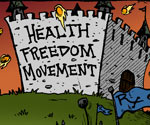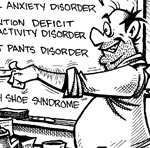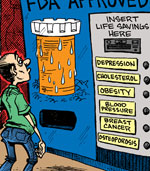Vitamin E Overdose - How Much Is Too Much Vitamin E?
| Share on Facebook | Share on Twitter | Share on Google+ |
You've probably heard the expression "too much of a good thing." Even though chances are you need a lot more vitamin E than the recommended daily intake, it's still possible to take too much vitamin E. Here's the main thing you need to know about the right dose of vitamin E.
You absolutely must get at least 12 to 15 units of vitamin E a day from food or supplements. You absolutely must not get more than about 5,000 units of vitamin E a day from supplements.
From 12 to 1200 units of vitamin E a day, there is no risk of interaction with any medications. From 1200 to 3200 units of vitamin E a day there is a possibility of problems if you take certain prescription blood thinners such as Coumadin (warfarin) or clopidrogel for your heart or for circulation to your hands and feet.
Like vitamin A and vitamin D, vitamin E is a fat-soluble vitamin. Unlike vitamin A and vitamin D, there is very little risk of a vitamin E overdose. The reason for this is:
until they build up to toxic levels. The liver can't store an indefinitely large amount of vitamin E.
Eating too many vitamin A- or vitamin D-rich foods can increase tissue stores of these vitamins by 2500% and liver stores of these vitamins by 10,000%. But you just can't increase your body's stockpiles of vitamin E by more than about 500%.
Laboratory studies have found that there is no dosage of vitamin E that damages DNA and that animals can be fed 1,000 times the recommended daily intake of vitamin E and live. Of course, you don't want just to survive taking vitamin E! You want to have better health as a result of taking vitamin E.
Clinical studies have tracked the effects of taking 50 to 3,200 IU of vitamin E a day. Here are the results:
- The Finnish Alpha-Tocopherol, Beta-Carotene study gave 50 IU of vitamin E a day to 16,000 male smokers.
- The Women's Health Study has been tracking the effects of 400 IU of vitamin E a day on 49,000 women.
- Two studies involving people with Alzheimer's or Parkinson's disease have given participants 2,000 IU a day, and
- One study gave thirty-six people with angina 3,200 IU of vitamin E every day for six weeks.
- Dr. Sambath Parthasarathy, a professor of medicine at Emery University in Atlanta, Georgia, in the USA, has written extensively on the use of vitamin E as a tool for preventing the oxidation of cholesterol that turns into a form that clog arteries. For several years he took 10,000 IU a day with no problems, but now he only takes 1,000 IU a day.
The only study that found there might be a connection between vitamin E and any health problem was the study that used the smallest dosage of the supplement. The Finnish Alpha-Tocopherol, Beta-Carotene study found that 16,000 smokers who took vitamin E every day had a slightly higher risk of a rare form of stroke called hemorrhagic stroke, basically a kind of bleeding in the brain. They had significantly lower risk of the more common ischemic stroke, prostate cancer, and colon cancer.
But the fact that these effects have not been seen in the 49,000 women who took eight times as much vitamin E suggests that the results may have been a fluke. And Dr. Parthasarathy has not encounted any of these kinds of problems, either.
There are anecdotal reports of other problems with vitamin E supplements that may not be caused by the vitamin E itself. The carrier oil for a poorly manufactured vitamin E supplement can go bad if the product is exposed to heat or light or allowed to sit on a shelf for literally years at a time.
You are highly unlikely to encounter these problems if you buy vitamin E from a high-quality supplier who sells over the Internet. You are only likely to encounter this problem if you are buying vitamin E that some retailer who doesn't sell many vitamins has found on a warehouse and suddenly puts on sale at a very low price. And if you do, the most likely result is stomach upset-from a rancid carrier oil.
It's also theoretically possible that you could take so much vitamin E that it would start acting as a pro-oxidant, that is, a kind of anti-antioxidant. This would only happen if you took an enormous amount of vitamin E (over 5,000 IU per day) and you were deficient in vitamin C and you took a statin drug for cholesterol that had the side effect of depleting your body's coenzyme Q10. It's not likely, but it could happen.
If you take 400 to 1,200 IU of a mixture of alpha-tocopherol with other forms of vitamin E every day, however, no problems have ever been reported. Speak with your doctor before taking vitamin E if you are taking any medication to thin your blood. (You may also like to visit our vitamin E dosage page)
-
Skin CareMen Skin Care
-
Free ResourcesFree eBooks
-
The way you think, the way you behave, the way you eat, can influence your life by 30 to 50 years.Deepak Chopra
-
Featured Health Supplement
 The restoration and maintenance of normal organ and brain function and a strong immune system is the key to vibrant health and in
avoiding premature-aging!
The restoration and maintenance of normal organ and brain function and a strong immune system is the key to vibrant health and in
avoiding premature-aging!
-



















